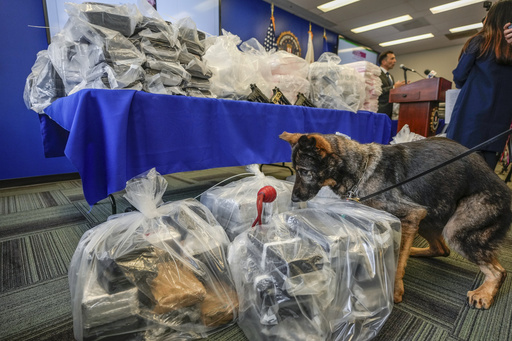
MEXICO CITY — Mexico’s “hugs, not bullets” policy, which prioritized social programs over confrontations with drug cartels for six years, may soon be revised under the newly elected President Claudia Sheinbaum. This strategy aimed at reducing cartel violence through social initiatives rather than military intervention is now facing challenges marked by recent violent incidents, suggesting a potential shift in approach.
As Sheinbaum takes the reins of the presidency after the departure of her predecessor Andrés Manuel López Obrador, who popularized the “hugs, not bullets” slogan, there is evidence that the government is increasingly willing to deploy military force and the National Guard against cartel activities. However, the current situation differs significantly from the drug war that spanned from 2006 to 2012, as contemporary cartels have diversified their activities—venturing into migrant smuggling and employing foreign recruits and young individuals.
This pivot towards military engagement has led to violent clashes. In many of these confrontations, security forces have fired at suspected cartel convoys, resulting in the deaths of bystanders and migrants. Notably, these engagements often yield reports of high casualty rates among suspects, while law enforcement personnel remain unharmed.
Sheinbaum has carefully navigated the language surrounding López Obrador’s strategies as she pledges continuity with previous policies. However, she has avoided outright endorsement of the “hugs, not bullets” phrase. “It’s not about offering hugs to criminals; it’s about providing support to vulnerable youths to deter them from joining cartels,” she stated soon after her inauguration.
While analysts observe a subtle change in tone towards organized crime, they caution against labeling it a full-scale policy reversal just yet. Experts like Falko Ernst suggest it would be politically risky for Sheinbaum to adopt a purely militaristic approach, given the influx of inflammatory imagery associated with such a stance.
Moreover, Sheinbaum’s administration appears less tolerant of cartel-related violence. Unlike her predecessor, who downplayed law enforcement confrontations, Sheinbaum has not celebrated improvements in the “lethality index”—which measures the outcomes of police engagements. During López Obrador’s term, he controversially halted the capture of notorious drug lord Ovidio Guzmán in an effort to prevent violence; however, Sheinbaum’s first week in office saw troops mistakenly open fire on a truck, resulting in the unnecessary deaths and injuries of migrants.
Subsequent incidents revealed a disturbing pattern: security forces have executed operations leading to civilian casualties, all while not suffering losses themselves. In one incident in Sinaloa, soldiers killed 19 suspected cartel members without taking any injuries. Another operation targeting gunmen ended with troops eliminating 17 suspects while sustaining zero casualties, raising questions about the increasing military aggression.
Security analysts contend that the emphasis on violence against drug cartels has returned, as evidenced by the heightened arrests and extraditions of key figures during Sheinbaum’s initial weeks in power. There is growing recognition among officials that cartels have now extended their operations into human smuggling, taking advantage of the recent shifts in migration routes and U.S. immigration policies. Cartels are profiting immensely from smuggling fees as migrants from distant regions seek passage to the U.S., sometimes being used by the cartels as shields or expendable resources during violent conflicts.
The ongoing escalation of violence under the Sheinbaum administration reflects a troubling trajectory for Mexican law enforcement. Analysts warn that the militarized approach equipped with untrained personnel generates a higher risk of civilian casualties. The National Guard’s current protocols for engagement have been criticized for being inadequately applied and reactive, leading to actions that often escalate situations without attempting non-lethal apprehensions first.
With the intertwining issues of organized crime, militarization of law enforcement, and the continuing flow of migrants, the landscape of violence in Mexico is poised for further tumult. The push for a more aggressive crackdown on cartels amid the evolving dynamics within drug trafficking organizations presents a precarious challenge for Sheinbaum’s administration and the safety of innocent civilians.
